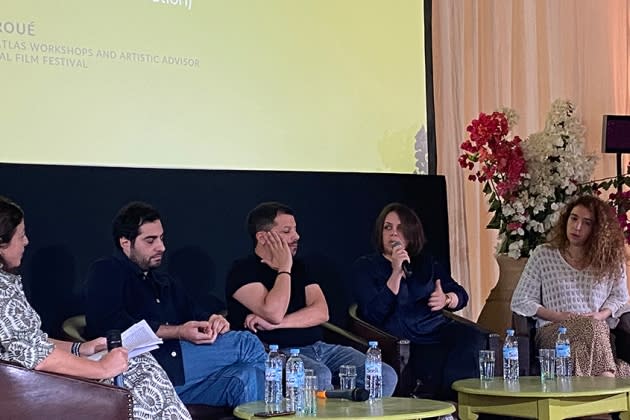Arab World Independent Film Distribution Broken Down at Atlas Workshops

MARRAKECH — Netflix has been a welcome addition to the Middle East and North Africa region, boosting audience interest in independent films. What’s more, it has added momentum to a renewed interest in local voices, thanks to new content created by a generation of free-thinking filmmakers, liberated by the Arab Spring.
That was the consensus opinion at the panel of top distributors from the region, who talked about challenges, trends and strategies in Wednesday’s Atlas Workshops panel on Independent Film Distribution in the Arab World.
More from Variety
Marrakech VP Faïçal Laraïchi on Two Decades of Glamour and Ever More Emerging Talent
Director Cristèle Alves Meira On Portugal's Oscar Entry 'Alma Viva'
Speakers took in Meriame Deghedi (MAD Solutions), Omar El Kadi (MC Distribution), Mohamed Frini (Hakka Distribution) and Jessica Khoury (Film Clinic Indie Distribution). They spoke to a room of invited filmmakers and industry execs, attending the three-day industry and mentoring program at the Marrakech International Film Festival (November 11-19).
Asked about his strategy for acquiring films, El Kadi said: “We follow our heart. There’s also a human connection with the filmmaker. It’s like a marriage. Then there is also a market to meet and the possibility to create a market and to create a need for this film. It’s not easy. It’s a challenge to release a film across the whole region.
Challenges include limitations in the personal budgets of potential cinemagoers, currency fluctuations in politically challenged countries, not to mention a lack of arthouse screens.
These distributors have therefore welcomed other ways of showing films from arts clubs to online. But a big screen release, like elsewhere, they said, helps cement a pay TV deal, which is where the region’s distributors are still recouping their costs.
Said El Kadi: “I think there is a huge opportunity to expand. We believe a lot can be done to enhance opportunities. There is a distribution problem in Morocco. It functions beneath its potential. When we arrived in Tunisia, an opportunity arose. Cinema theaters were completely deserted. The public didn’t want to go to the cinema and had deserted Tunisian films.
He went on: “Before 2013, we couldn’t reach 200,000 spectators a year in all of Tunisia. Now it’s 2.8 million. There is a new generation bringing new ideas. Freed up by the Arab Spring because we lived in a dictatorship before for 70 years. So it has liberated a lot of voices. It has boosted the interest in the public for cinema theaters. We see the opportunity to make more interesting projects.”
How to launch a film correctly was another topic of debate.
Said Frini: “We wonder how to launch our films, for fragile films festivals are often the right way. Some festivals are the right festival. Then there’s the cultural industry theaters to try throughout the year. Once we have put the film in cinema rooms, we try to find other spaces, like in Tunisia’s culture houses. We need festival exposure but also for directors to meet local audiences.”
Cannes might not be the right choice for each film.
“I know the dream of most directors starts with Cannes, Venice, and Berlin, but I disagree,” Deghedi commented. For me, it needs to be the right audience. It’s not good if it gets poor reviews so it’s important to start at the right festival.”
Media and having a choice of platforms matter just as much.
“In Tunisia, there is an audience, so if there is a good film it will be covered by the media, if it is at a media visible festival. We also have to make sure that audiences will get to the film, even if they don’t like cinemas, by offering an alternative set of distribution channels.”
Added El Khadi: “The arrival of platforms in the region has shaken up the industry’s landscape, like Netflix arriving in the Mid-East, which has created a demand for local films like McDonald’s in India offering Tandori burgers. Streamers have started buying local content, and the whole region has taken advantage of that. Contact with the public is essential in cinema rooms but we need a profit.”
Best of Variety
Sign up for Variety’s Newsletter. For the latest news, follow us on Facebook, Twitter, and Instagram.
